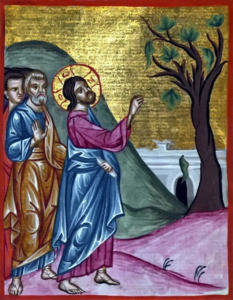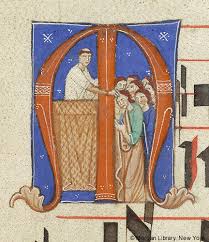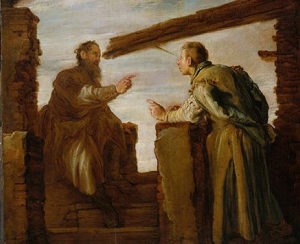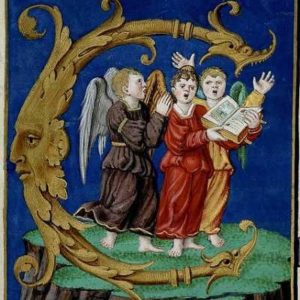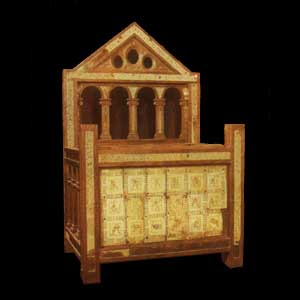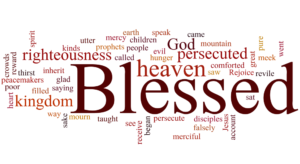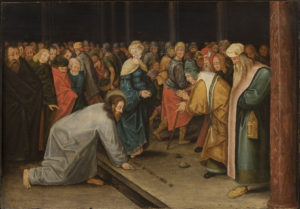
Christ and the Woman Taken in Adultery, Pieter Brueghel II
Mount Calvary Church
A Roman Catholic Parish
The Personal Ordinariate of the Chair of S. Peter
Eutaw Street and Madison Avenue
Baltimore, Maryland
Rev. Albert Scharbach, Pastor
Dr. Allen Buskirk, Choirmaster
Lent V
April 7, 2019
8 A.M Said Mass
10:00 A. M. Sung Mass
Breakfast in the undercroft following the 10:00 A.M. Mass
____________________
Common
Missa de Angelis
____________________
The Great Litany
The Great Litany was the first service written in English. It was composed by Thomas Cranmer in 1544 from older litanies: the Sarum rite litany, a Latin litany composed by Martin Luther, and the Divine Liturgy of St. John Chrysostom. The word litany comes from the Latin litania, from the Greek litê, meaning “prayer” or “supplication.” Litanies are penitential exercises. They are the urgent supplications of the people of God suffering under or dreading divine judgements and asking to be spared or delivered from calamities which at the same time they confess that they deserve. After invoking the Trinity, we ask to be delivered from the evils that come upon us because of sin: heresy, schism, natural disasters, political disasters, war, violence, murder, and sudden and unprovided death.
__________________
Anthems
William Byrd (1540-1623)
Miserere mei Deus, secundum magnam misericordiam tuam, et secundum multitudinem miserationum tuarum, delle iniquitatem meam.
Have mercy on me, O God, according to thy great mercy. According to the multitude of thy commiserations, take away mine iniquity.
__________
Orlando Gibbons (1583-1625)
O Lord, in thy wrath rebuke me not: neither chasten me in thy displeasure. Have mercy upon me, O Lord, for I am weak: O Lord, heal me, for my bones are vexed. My soul is also sore troubled: but, Lord, how long wilt thou punish me? O save me, for thy mercy’s sake.
__________________
Hymns
What wondrous love (WONDROUS LOVE) is, as its repetitions evidence, an American folk hymn, from the Second Great Awakening. This hymn articulates the question that Christians ask every day: what did I do to deserve such a wonderful love from God and from Christ? The hymn is an offering of thanks to the Son for laying aside his crown as King and humbling himself even unto death. Jesus took on the sin and shame of man and thereby became the Lamb who was slain to save us from our sins. Jesus is not only the Lamb, but he is I AM, Lord and God. Our response is endless praise, and forever we shall marvel and ask, “What wondrous Love?”
O sacred head sore wounded (PASSION CHORALE) was composed by Paul Gerhardt (1607—1676), who closely modeled it after a stanza of a poem, Salve mundi salutare, possibly by St. Bernard of Clairvaux (1091-1153) or Arnulf of Leuwen, which contains seven stanzas meditating on how the different parts of Jesus’ body suffered during the Passion. The head is the seat of honor, “face,” and was insulted by a mocking crown of thorns, by spit, and blows from fists. Yet it is the vision of that face that will be our happiness and joy forever, for He has born all our guilt and shame, and given us His life.

